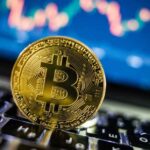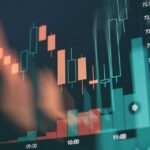Lately, criticism and warnings about the U.S. stock market – and arguably by extension, the world economy – have been coming in hot from all sides.
While the major U.S. stock market indices such as the S&P 500 and the Dow Jones Industrial Average (DJIA) have been doing exceptionally well, a significant shadow has been growing due to multiple factors.
For one, the movements of the indices have been strikingly similar to what was seen at the start of 1929 and the concentration of gains within the top five companies have been slowly activating the alarm bells.
Additionally, despite the rather high interest rates. inflation has slowly started heating up again with the odds of cuts in 2024 seemingly becoming lower and lower.
Global analyst warns of major stock market bubble
In early April, a global strategist at the banking giant Société Générale (EPA: GLE), Albert Edwards – notable for foreseeing the Dot-com bubble – weighed in on the matter saying that between FED not being restrictive enough, and optimism about the artificial intelligence (AI) boom, the stock market has become a full-blown bubble.
According to Edwards, the incredible enthusiasm surrounding AI firms – long described by major institutions as the biggest driver of the expected strong stock market performance in 2024 – is not particularly well-founded.
According to the analyst, once major companies like Nvidia (NASDAQ: NVDA) are excluded, the technology has failed to deliver strong earnings growth thus ensuring that the current sky-high valuation of many involved companies constitutes an AI bubble.
Finally, Edwards is also critical of the FED as he believes the central bank is not being restrictive enough and has, between keeping interest rates fixed for more than a year and turning its rhetoric decisively more doveish of late, tacitly helped further inflate the bubble.
Recessionary fears persist despite strong market performance
Despite things going well in the world of finance at first glance, there has, in fact, been an alarming number of voices from various positions warning of a looming crisis.
For one, the world’s largest bank by market capitalization and America’s biggest such institution, JPMorgan (NYSE: JPM) has estimated that there is still a 65% chance of a recession in mid-March and warned that stocks could crack at any moment later in the same month.
Additionally, the prominent investor and author of the best-selling personal finance book ‘Rich Dad Poor Dad,’ Robert Kiyosaki, has also been warning of a major and imminent stock market wipe for many months while advising his followers to find safety in commodities like gold and silver, and the world’s premier cryptocurrency, Bitcoin (BTC).
Is there a system-wide crisis as well?
Warnings have also been coming from the opposite end of the spectrum as well.
Yannis Varioufakis, the economist and former finance minister of Greece, has been warning for years of greater instability in the system since, in his opinion, few companies are actually profitable nowadays with profits now mostly coming directly from the digital printing presses of the central banks.
Varoufakis’ theory of ‘Technofeudalism’ also appears to fit fairly well into the consolidation of gains into the top five S&P 500 companies – as does a concept of how social media platforms devolve, devised by Cory Doctorow in November 2022 fit into the possible future of AI profitability, if Google’s (NASDAQ: GOOGL) rumored plans for paid searches are any indication.
The threat of reheating inflation
In a sense, the sentiment that central bank funds have replaced profits was also echoed in the criticism expressed on X by Gordon Johnson, the founder and CEO of GJL Research, who stated that, in essence, the FED is handing out money to private institutions that are then pumping the stock market.
The analyst believes this is part of the reason why the U.S. is headed toward a new and even greater inflation crisis.
Still, not all notable experts and investors foresee doom and gloom. Steve Eisman, one of ‘The Big Short’ investors, has recently opined that the economy is doing well and that, in fact, the crisis is only likely if the FED attempts to intervene further – particularly if it tries to prematurely lower interest rates.
Buy stocks now with eToro – trusted and advanced investment platform
Disclaimer: The content on this site should not be considered investment advice. Investing is speculative. When investing, your capital is at risk.








